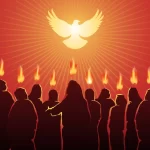Life is always a bumpy road and we all encounter the monster of suffering one-time or the other. In the words of Job, “Man is born unto trouble”, none of us will ever graduate from the school of pain and suffering as long as we live in the world. As a pastor, I have walked with people in their tough struggles and challenges but the year 2020 has been like no other year; it is absolutely unprecedented for the entire world. Coronavirus has seriously impacted all sections of society causing catastrophic ramifications along with it. We have observed that this virus is no respecter of gender, status, place, age, race, religion, or education. We have always bragged about human inventions striving to make the world a better place, but, in times like this, we are made to admit how vulnerable and fragile we are. Isn’t that true?
Every so often, trusting Him goes outside our natural instincts and logic, but we are to trust Him with all our heart; heroes in the Bible stand as true witnesses to this truth.
If we were to describe the year 2020 in just one word, perhaps the most appropriate word would be “uncertainty”. We have witnessed multiple issues related to social, economic, political, educational, agricultural, psychological, and many more aspects of life. The migrant worker crisis, collapse of the economy, job losses, pay cuts, loss of access to healthcare services, disruption in education, and the locusts’ attack on food crops are some of the visible tragedies we all have noticed in 2020. Along with the list of these uncertain matters are so many other questions that plague us: Is the COVID-19 vaccine safe? When will life be back to “normal”? When will the farmers’ protest end? What are the ongoing effects of this pandemic? When will the tensions on the borders come to an end? Are the news channels broadcasting the truth? Is our privacy being breached? Is freedom of expression curtailed? Is democracy crippled? We live in a time of much uncertainty.
For years, the world has been preaching and selling us the gospel of “certainty on earth” via various means, and in fact, our constant endeavour is to ensure certainty and a problem-free life; but that is not always the case. Let us have the honesty and courage to admit the fact that certainty on this earth is a myth. People are instinctively driven to live a life in this world as if it has no end, but this world is always changing, and things are always unstable. It’s sad but true that the ones who believe in the gospel of “certainty on earth” including the Christians, constantly get the shock of their lives when faced with unpredictable tragedies. The psalmist had grasped this truth of “uncertainty on earth” in Psalm 46:2–3 (The Voice): “No fear, no pacing, no biting fingernails. When the earth spins out of control, we are sure and fearless. When mountains crumble and the waters run wild, we are sure and fearless.Even in heavy winds and huge waves, or as mountains shake, we are sure and fearless.” Dreaming of a utopian world on this earth is purely a mirage; yet, none of us want to tread the waters of uncertainty since we are hardwired to look for something certain to stand on.
Uncertainty can create a tremendous amount of anxiety when not handled rightly. In explaining The Psychology of Uncertainty,Bryan Robinson writes, “When certainty is questioned, your stress response goes haywire, instantly arousing your fight-or-flight reaction, kicking you in the pants in an attempt to spur you to action and get you to safety. Waiting for certainty can feel like torture by a million tiny cuts.” Since we are instinctively drawn to live a stress-free life, we do our best to mitigate uncertainty, but research reveals that we tend to gravitate towards wrong thoughts and habits, and we compromise on our values in coping with uncertainties. Then, what is the answer for rightly handling uncertainties?
While the scripture highlights the fact that we are living in a world of uncertainties, it also, most importantly, provides us the key to rightly fight it—hope in God. Lewis B. Smedes, a renowned Christian author and theologian says, “Hope is to our spirits what oxygen is to our lungs. Lose hope and you die. They may not bury you for a while, but without hope you are dead inside. The only way to face the future is to fly straight into it on the wings of hope….hope is the energy of the soul. Hope is the power of tomorrow.” In other words, loss of hope simply means an invisible death, a life of despair, and a plunge into uncertainties. I imagine, perhaps the dreadful torment in hell will be the absence of hope because there is no bigger agony to a person than robbing his hope from him. But the good news is people in Christ can find hope in this hopeless world because they worship a God of hope.
Christian hope is distinct from other forms of hope; it is not a wishful thinking or a positive attitude. It neither minimises the pain in life nor turns a blind eye to the existence of suffering. Christian hope is intended to grant us peace, not just in the distant future, but even in the midst of pain and challenges. The biblical understanding of hope is a certain and confident expectation. While faith is looking up to God and love is looking all around, hope is looking forward with expectation in God, it is grounded on the expectation of the fulfilment of His promise.
Christian hope is distinct from other forms of hope; it is not a wishful thinking… It neither minimises the pain in life nor turns a blind eye to the existence of suffering. Christian hope is intended to grant us peace…
It is God who Generates Hope in Us
We do not possess the power to manufacture hope within ourselves. God is the author of hope and He generates hope in us; after all, He governs the course of history. 1 Peter 1:3–4says: “He has caused us to be born again to a living hope through the resurrection of Jesus Christ from the dead, to an inheritance that is imperishable, undefiled, and unfading, kept in heaven for you.” We were alienated from God because of our sins, we were a people without hope, but it is God who has caused us to be born again through His resurrected son and He has bestowed us a radiant hope. He made this possible by defeating the greatest enemy that sweeps the whole world – death. This hope is founded on the greatest historical and powerful event in human history—the resurrection of Jesus. The hope that we have through the resurrection of Christ affirms to us that there is more to life than what we are experiencing now in the world.
What do we hope for? How do we hope for? God is the object of our hope; we find hope in the promises given to us in the scriptures. It is through the scriptures that God imparts to us His promises—who He is and what He will do for us. In a perilous and dark time, Jeremiah penned these words: “The LORD is my portion and my inheritance,” says my soul; “Therefore I have hope in Him and wait expectantly for Him.” (Lamentations 3:24) Jeremiah’s hope was placed in the very person of God, and therefore, he was able to stand strong in his darkest time. Hebrews 6:13 says, “Since there was no one greater to swear by, God took an oath in his own name”. When taking an oath, a supreme power is called upon as the witness, and since there is no bigger being than God, God swore to Abraham by His own name. God guarantees that His promises would certainly come to fulfilment because they are as certain as He is certain.
Since His promises are not superficial nor fleeting, we are called to trust in Him. Trusting God does not occur instinctively, nor is it a one-time affair, it is a deliberate and relentless choice. Every so often, trusting Him goes outside our natural instincts and logic, but we are to trust Him with all our heart; heroes in the Bible stand as true witnesses to this truth. We have entered a new year, let’s search our hearts to see where our hope is placed in 2021. If our hope is on momentary significance, security, status, or relationship, then certainly life will become a mess when they are gone.
Hope is a Safeguard
The scripture provides us with two interesting analogies for hope. Firstly, Hebrews 6:19 says: “Hope is the anchor of the soul.” The purpose of an anchor is to keep the ship from wandering and to provide sturdiness in the storm. Similarly, if we are not anchored, we will frequently wander from our goals, and when life gets tougher, we will be tossed by the waves and eventually drown in the storm; the bigger the ship, the bigger the anchor we need to have. Secondly, hope is like a helmet. 1 Thessalonians 5:8: “…let us be sober, putting on faith and love as a breastplate, and the hope of salvation as a helmet.” Life is like riding a bike on Indian roads and we all need to wear a helmet of hope for our protection. Dare we step out on the rough roads of life without wearing hope? May we place our hope in God alone in 2021 and declare along with the hymnnist, “My hope is built on nothing less than Jesus’ blood and righteousness … all other ground is sinking sand, all other ground is sinking sand”. People who genuinely and continually put their trust in Christ as their saviour will experience the promised hope of God—remember, the closer we draw to God, the more hopeful we become.






